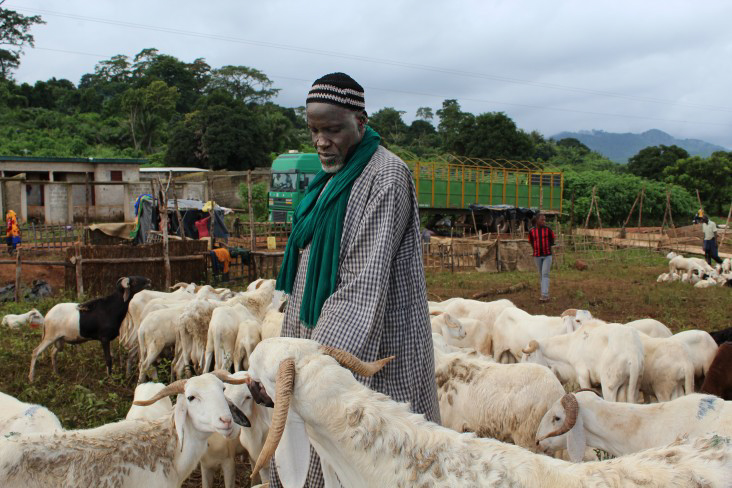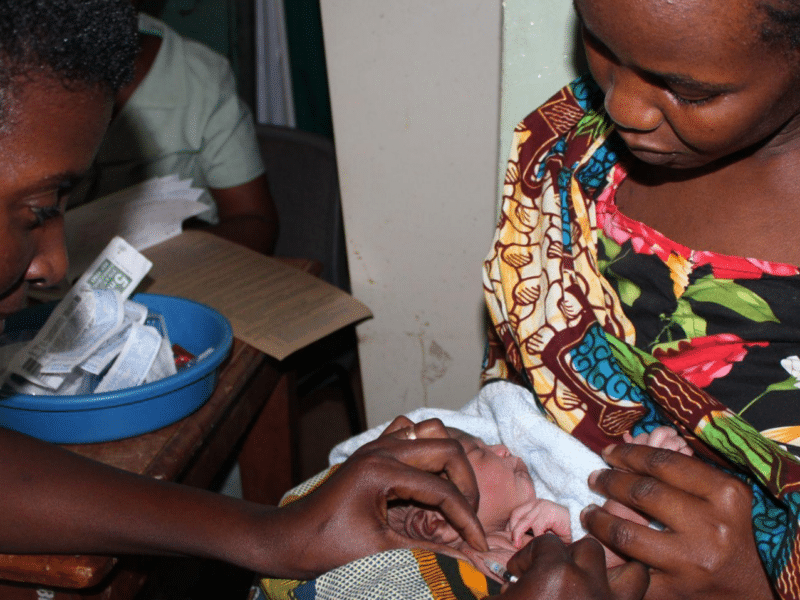In preparing for the next outbreak of a zoonotic disease in West Africa – that is, a disease that can be spread from animals to humans – preliminary research finds creating messages focused on people’s economic livelihoods, and not necessarily their health, are more likely to resonate.
The research, conducted by the Johns Hopkins Center for Communication Programs in Côte d’Ivoire, was designed to lay the foundation for responding to disease outbreaks like the deadly Ebola crisis, which found West Africa woefully unprepared in 2014. The researchers are trying to understand the behaviors that contribute to increased risk of transmission of the country’s top-priority zoonotic diseases and hope to instill healthy habits that can be ramped up if and when the next epidemic arrives.
“Some people don’t even know that their animals can make them sick,” says CCP’s Danielle Naugle, PhD, who is leading the zoonotic disease research. “We need people to understand what threats are out there and what to do in case of a crisis, so that an outbreak isn’t the first time they’re hearing of these types of diseases and how they can protect themselves and their animals.”
The Côte d’Ivoire work is being conducted through CCP’s Breakthrough ACTION project and funded through the U.S. government’s Global Health and Security Agenda (GHSA). To ensure the research could be rapidly available to inform disease prevention messaging, Naugle and the CCP team developed a way to quickly distill the data collected on the ground. Data analysis that would typically take months to complete was done over five days in March by a team of data collectors, government ministry officials and CCP staff.
Similar research will be conducted in Mali, Senegal and Guinea in the coming weeks and months, again using the accelerated approach.
Among CCP’s objectives in Côte d’Ivoire are to help the government create a national risk communication strategy and to set up systems for rumor tracking and response, both necessities when addressing an outbreak of any kind. The research findings will directly shape these activities, providing stakeholders with rich, nuanced information about at-risk communities’ understanding of zoonotic disease risks and current practices.
No one knows for certain what the next outbreak will be, but CCP is focused on five categories of priority zoonotic disease in Côte d’Ivoire: mycobacterium, Brucella (bacteria mostly spread by unpasteurized dairy products), viral hemorrhagic fevers (such as Ebola, Lassa and Marburg), arbovirus (dengue, yellow fever) and bird flu. Very little research has been done on what individual, social and cultural factors influence behaviors that contribute to the spread of these zoonotic diseases in West Africa.
Animals have long been a source of many disease outbreaks. Ebola, for example, has been linked to eating bushmeat infected by bats with the virus.
There are so many people in Côte d’Ivoire who come into contact with animals and animal products as part of their daily lives and who share living spaces with animals. As one focus group participant shared, “Here, traditionally, when you visit your grandmother or grandfather you’ll find chickens laying eggs under their mattress . . . and, in the courtyard, sheep will eat leftover rice from the same plate we eat from. Sheep aren’t considered dangerous and these practices are part of our customs.”
In an outbreak, each of these people could suddenly be handling a deadly virus or bacteria. To conduct their research, the CCP team involved people who come in frequent contact with animals in focus group discussions and community leaders, veterinarians, healthcare workers and media professionals in in-depth interviews. They also observed some of these people at work on farms, in slaughterhouses, in restaurants and in markets.
What they learned is that many people are relatively unconcerned by the potential for diseases transmitted by animals to affect their own health. Instead, their main concern is their economic livelihood – how to protect the animals that are their sources of income. One focus group participant explained: “He’s considering his investment, not his health.”
“We can’t frame messages through a public health lens telling people to do this or that to keep themselves healthy because it is not likely to be effective,” Naugle says. “Economic considerations, however, are where we have leverage. Framing actions as protecting people’s livelihoods and helping to improve profits could be more effective in changing behavior.”
It’s not just the messages that will be important. It’s the messengers.
Typically, health workers are the main source of information about how to prevent the spread of disease during outbreaks. In the case of preparedness for zoonotic diseases, the messages could be more effective coming from cooperatives or associations of farmers, for example.
There’s also the issue of trust that needs to be addressed. Farmers are afraid to report disease outbreaks to the government for fear that authorities might kill their animals, providing little or no compensation and destroying their businesses. But if potential epidemics are kept secret, it can give a disease more time to spread – making them more dangerous down the line.
Often, those who work with animals don’t believe the risks of deadly disease are real. And, Naugle says, at the moment the risks for some zoonotic diseases are objectively low. But an outbreak could change all of that.
Reducing risk needs to happen before an outbreak occurs, Naugle says, so that people understand the roles they need to play once it arrives. Everyone needs to vaccinate dogs against rabies and wash hands with soap and water, she says. Farmers need to routinely quarantine new animals. Butchers need to wear protective clothing and regularly disinfect chopping blocks. And cooks need to prevent cross-contamination between raw and prepared foods.
“We want people to develop healthier habits before an emergency strikes,” Naugle says. “Without a foundation of trust, planning and healthy habits, an outbreak will be more difficult to control.”





